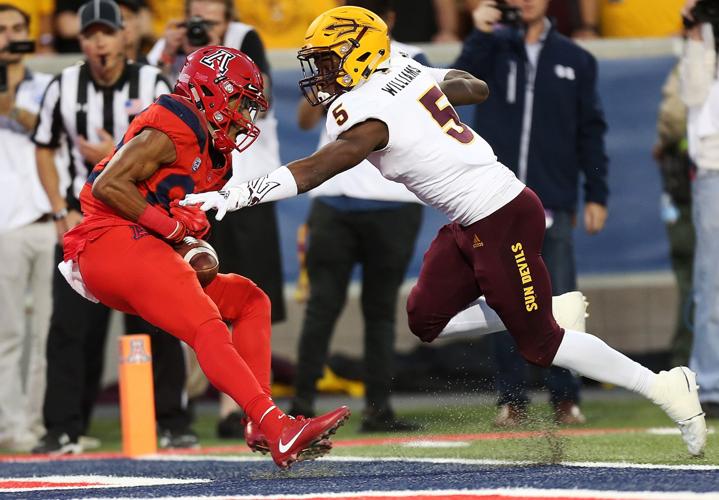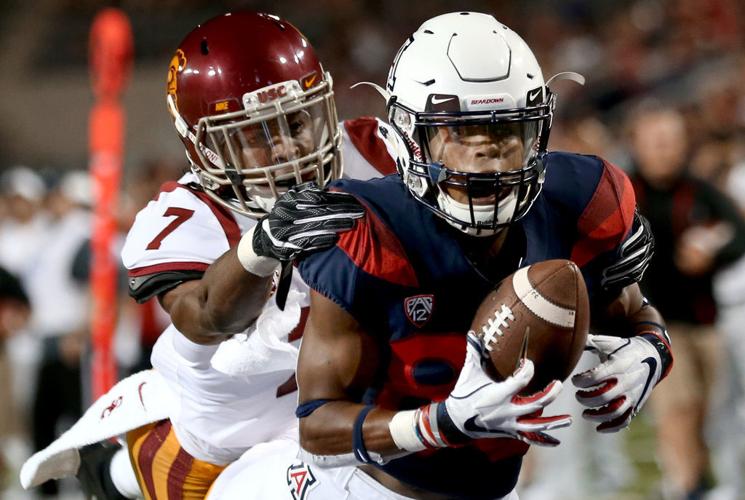When he played baseball in Tucson’s Western Little League, Stanley Berryhill III hated to lose so much that the slightest failures — a strikeout as a batter, a walk as a pitcher — would make him cry.
His father appreciated young Stanley’s competitiveness and passion but knew he had to coach him through it.
“You can’t be like that,” Stanley Berryhill Jr. told his son. “Because the next battle is coming up.”
That advice would come in handy years later, when Stanley III failed … and then succeeded.
Now a wide receiver for the Arizona Wildcats, Berryhill was positioned to become a hero for his hometown school. Arizona trailed rival Arizona State 41-40 with less than a minute to play in the 2018 finale. The Wildcats had the ball at the ASU 31-yard line. Quarterback Khalil Tate launched a pass toward Berryhill in the end zone.
The ball was slightly underthrown. Sun Devils cornerback Kobe Williams had tight coverage. Tumbling backward, Berryhill tried to squeeze the ball but couldn’t quite corral it.
Two plays later, Arizona missed the would-be winning field goal. The Territorial Cup remained in Tempe. Berryhill was left to ponder what could have been.
“It’s on me to make the catch,” Berryhill said this week amid preparations for the home opener Saturday night against NAU. “Even if it’s a tough catch, regardless of what’s going on in the play, how the ball came, how the route looked. If it comes to me, I gotta come down with the ball in crunch time.”
His dad thought back to Little League. Stanley III was a two-way player. If he struck out to end an inning, he had to get it together before taking the mound to pitch.
Stanley Jr. conveyed that message to his son after the ASU game: It’s all about what’s next.
“The first thing I said to him was, ‘You know the ball is going to come to you again, and you will catch it,’ ” Stanley Jr. said.
“That was the end of that conversation.”
Stanley III had to wait nine months. Sure enough, his opportunity came.
Berryhill caught three passes for a team-high 92 yards and a touchdown in Arizona’s season opener two Saturdays ago at Hawaii. The TD, a nifty sideline grab, knotted the score late in the third quarter. Berryhill’s 57-yard hookup with Tate in the fourth quarter helped the Wildcats climb within a touchdown. They ultimately would lose by that margin.
Ten days later, personal redemption wasn’t at the forefront of Berryhill’s mind.
“We all just try to come together as a team and win games,” he said. “If we can’t do that, then individual stats don’t matter.”
Seeking ‘a fair shot’
Berryhill came to the UA as a walk-on. In August 2018, he earned a scholarship. It was the culmination of a long, unconventional journey.
Despite posting big numbers at Mountain View High School, Berryhill wasn’t attracting the attention from big-time colleges that he and his dad thought he deserved. Berryhill could run routes precisely, but he didn’t have exceptional size (he’s listed at 5-10, 177) or speed. It was hard to stand out.
“We just felt he wasn’t getting a fair shot,” Berryhill’s father said.
While attending a camp in Los Angeles, Stanley Jr. ran into his former roommate at Langston (Okla.) University, Matthew Hatchette, who played six seasons in the NFL for the Vikings, Jets and Jaguars.
Hatchette was the offensive coordinator at Orange Lutheran High School in Orange, California. The Lancers were members of the Trinity League, one of the top prep conferences in America.
Hatchette hatched an idea: Stanley III could transfer to Orange Lutheran for his senior year to get more exposure.
“He’d definitely get better looks if he played in this league,” Hatchette told Stanley Jr.
It wasn’t an easy sell, particularly for Berryhill’s mother, and the family wasn’t sure what to do. Stanley III would have to live on his own part of the time as an 18-year-old. It was a significant change.
But Stanley Jr. thought he had prepared his son, who’s one of nine siblings, for just that sort of challenge. Stanley Jr.’s father wasn’t part of his life for much of it. So he instilled in his sons that they needed to be ready to take care of themselves.
In June 2016, Stanley III made the call: He wanted to give this experiment a shot. His family got him an apartment in Long Beach. Stanley Jr. would spend Friday-Sunday of each week in Southern California. Hatchette, a trusted family friend, would be nearby to help.
The Hilinski family — whose youngest son, Ryan, was about to become Orange Lutheran’s starting quarterback — also looked after young Stanley.
His dad framed the experience as the equivalent of going to a college-prep school for a year. Berryhill thrived in the high-profile Trinity League, catching 63 passes for 961 yards and nine touchdowns in 11 games.
Yet the scholarship offers the Berryhills had been seeking still didn’t come.
Sticking it out
Berryhill drew interest from ASU, Cal and Washington State, among others. The story was always the same, though:
We have one spot open, and we’re looking at two or three guys. If things fall through, it’s yours.
In lieu of a scholarship offer, Berryhill would have to come aboard as a preferred walk-on. He wanted to play football and baseball in college — he had legitimate offers in the latter — and committed to ASU to pursue that plan.
Former UA receiver Charles McKee, who had tutored the elder Berryhill during his football-playing days, didn’t like the idea of a gifted Tucson prospect playing for the Sun Devils. McKee arranged for then-Arizona coach Rich Rodriguez to watch Berryhill’s film.
Rodriguez was impressed. He extended the same offer to Stanley III: Come to the UA as a preferred walk-on.
Berryhill accepted, but his freshman season left him frustrated. He had a minor knee injury, and he didn’t play. Berryhill considered transferring to Pima College to play baseball. His father wasn’t pleased.
“Me and him had it out,” he said. “I didn’t talk to him for two weeks.”
The way Stanley Jr. saw it, “God has put us in this position. There’s no way we can lose.”
He advised his son to give it a year to “finish what he started.” If he hadn’t earned a scholarship by then, Stanley III could pursue an alternative.
Rodriguez was fired in January 2018. The new offense under Kevin Sumlin and Noel Mazzone would feature an NFL-esque route tree, accentuating Berryhill’s strengths.
He went to work that spring. Berryhill scored a 37-yard touchdown on a bubble screen in the spring game, weaving through the UA defense.
Four months later, Sumlin put Berryhill on scholarship. He caught 14 passes for 218 yards and two touchdowns in a part-time role last season. He’s off to a promising start this year.
“He works his tail off every day,” Sumlin said. “You saw the reaction from the team last year when we gave him a scholarship — how happy everybody was for him.
“Where he’s come from, how hard he’s worked, what he’s done … you’re really happy when you see a guy like that start to have success.”





